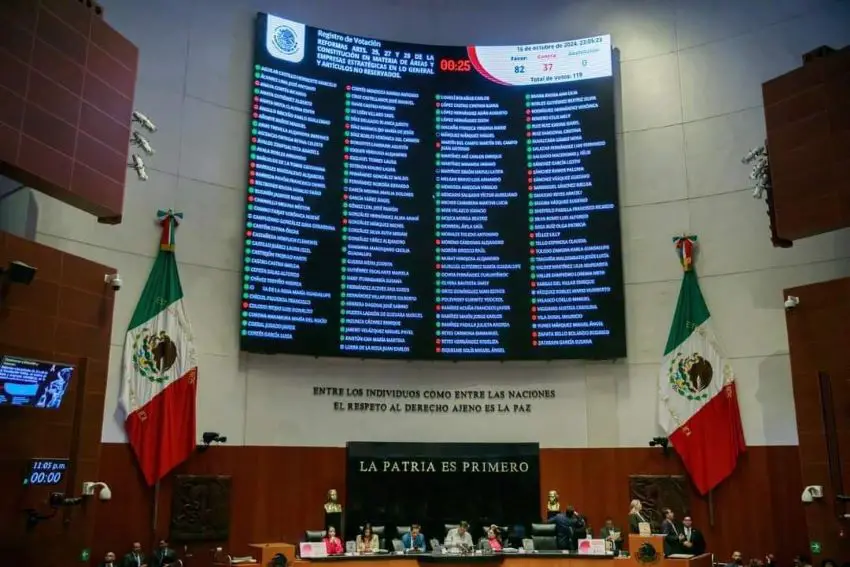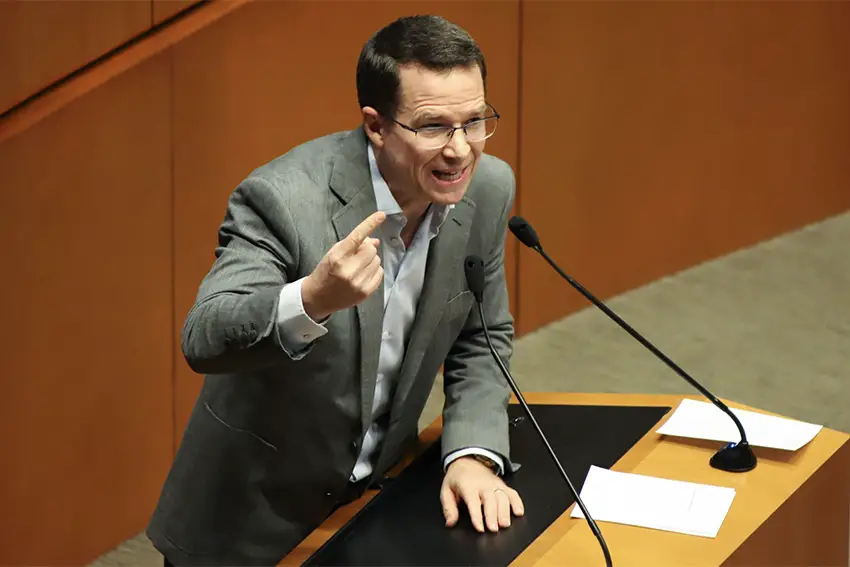Mexico’s Senate approved the federal government’s energy reform bill early Thursday, passing legislation that seeks to constitutionally enshrine state dominance in the electricity sector, among other objectives.
Senators with the ruling Morena party and its allies voted to approve the bill shortly after midnight, as did National Action Party (PAN) Senator Miguel Ángel Yunes Márquez, ensuring that the two-thirds threshold to pass constitutional reform proposals was met.

The final count was 86 votes in favor, 39 against and one abstention.
The bill, which was sent to Congress by former president Andrés Manuel López Obrador in February and approved by the Chamber of Deputies last week, will now be considered by Mexico’s 32 state legislatures for ratification.
At least 17 must ratify the reform proposal before President Claudia Sheinbaum can sign it into law. Ratification by a majority of state Congresses is essentially a fait accompli as Morena is in power in more than 20 states. Sheinbaum is expected to sign the bill.
‘A historic error’
Promulgation of the bill will result in the revocation of parts of the 2013 energy reform, which opened up Mexico’s energy sector, including the state-owned Federal Electricity Commission (CFE) and state-owned Pemex oil company, to private investment.
While the reform will limit the participation of private and foreign companies in Mexico’s electricity sector, it will not preclude them from playing an important role in ensuring that Mexico can meet demand for power and make the transition to greater use of clean energy sources.

Still, Morena Senator Óscar Cantón Zetina said that the objective of the bill is to “reverse the historic error” made by former president Enrique Peña Nieto’s (2012–2018) energy reform.
In light of its approval, Morena’s leader in the Senate, Gerardo Fernández Noroña, said that it was “another historic day” for Mexico.
Several other constitutional reforms, including one that allows citizens to directly elect all judges and another that placed the National Guard under military control, have been approved by Congress since recently elected lawmakers assumed their positions on Sept. 1.
What are the key aspects of the energy reform?
- Once promulgated, the Mexican state via the Federal Electricity Commission will have a constitutional right to generate and supply the majority (54%) of electricity in Mexico. Private companies will share the remaining 46% of the market.
- The CFE and state oil company Pemex will no longer be called “productive” state companies, but rather “public” state companies. According to a Senate press release, the CFE and Pemex were renamed “productive” state companies on the recommendation of “international financial organizations.” The renaming “distorted the obligation of the state to guarantee the public service of electricity and reduced [its obligation] to the mere obtention of profits,” the statement said.
- The Bloomberg news agency reported that President Sheinbaum will “gain increased control over Pemex and the national electricity utility” if the reform bill becomes law. The reclassification of Pemex and the CFE from “‘state productive companies’ to ‘public companies’ … would force the companies to prioritize the government’s social and economic objectives over corporate profits,” Bloomberg said.
- The newspaper El Sol de México reported that CFE and Pemex “will lose their operational autonomy” and will once again “be under government control” after the reform bill becomes law.
- The bill states that the CFE has the obligation to provide electricity at the cheapest possible price. The CFE will also be able to provide internet services once the bill becomes law.
- According to the bill, secondary laws will establish how private companies can participate in Mexico’s electricity market. An earlier version of the bill gave the Mexican state sole responsibility for the energy transition. However, that provision was removed, ensuring that private companies can operate renewable energy facilities in Mexico and thus help the federal government reach its renewable energy targets.
- According to the bill, state energy companies won’t be considered as having monopolies, even if they have complete control of an industry, as will be the case in Mexico’s nascent lithium sector with the state firm Litio para México (Lithium for Mexico).
- The bill “returns energy sovereignty to the country,” said Senator Cantón Zetina, “given that it establishes that electricity, hydrocarbons, lithium and the internet will no longer be objects of speculation and monopolization by private interests.”
Competing views on the energy reform
Morena Senator Laura Itzel Castillo Juárez said that the approval of the reform bill provides “firm steps” toward the recovery of Mexico’s energy sovereignty as the legislation reverses changes made in 2013.
During the six-year term of Peña Nieto, the aim of the government was to “dismantle” the CFE and Pemex, “turn them into scrap and hand them over to the highest bidder,” she said.
Green Party Senator Virgilio Mendoza Amezcua said that the 2013 energy reform left the sector “weakened, indebted and at the mercy of [private] economic interests.”
The bill approved by the Senate will allow mistakes of the past to be corrected, he said, adding that it will support the CFE and Pemex, as well as Mexico’s quest to develop the lithium sector.

Labor Party Senator Alberto Anaya Gutiérrez noted that “the doors are [still] open to foreign capital” in the energy sector, but said that the reform will ensure that the Mexican state takes the leading role in the nation’s electricity and oil industries.
For her part, PAN Senator Imelda Sanmiguel Sánchez asserted that the reform seeks to “saddle” Mexican citizens with the debts of the CFE and Pemex, the world’s most indebted oil company.
The future of the following generations will be placed at risk “under the nationalist argument of energy sovereignty,” she said.
PAN Senator Ricardo Anaya, a presidential candidate in 2018, questioned the need to limit private companies’ participation in electricity generation.
“We believe it’s folly because in the end what people want are three things: clean energy, number one; cheap energy, number two; and abundant energy, number three,” he said.
“We can’t support the reform while the CFE continues burning fuel oil to generate electricity,” Anaya said.
While former president López Obrador championed the ongoing use of fossil fuels to generate electricity, President Sheinbaum is committed to increasing the use of renewable sources and has pledged to invest some US $13 billion in a renewables-focused energy plan.
On Wednesday, Senator Ricardo Anaya also said that the reform could create difficulties for Mexico at the 2026 review of the UMSCA free trade pact given that it limits foreign investment in the energy sector.
Institutional Revolutionary Party Senator Mely Romero Celis asserted that the reform “subsidizes inefficiency” in the CFE and Pemex and is “a backward step disguised as progress.”
She also claimed that the CFE and Pemex don’t have the capacity to support themselves without collaborating with private companies.
With reports from El Financiero, La Jornada, Latinus, Aristegui Noticias and El Sol de México
